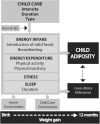Cohort profile for the Nurture Observational Study examining associations of multiple caregivers on infant growth in the Southeastern USA
- PMID: 28179416
- PMCID: PMC5306520
- DOI: 10.1136/bmjopen-2016-013939
Cohort profile for the Nurture Observational Study examining associations of multiple caregivers on infant growth in the Southeastern USA
Abstract
Purpose: Childcare has been associated with obesity in children in cross-sectional and longitudinal studies, although some observed no association. Few studies have focused on care during infancy, a period when children may be especially vulnerable.
Participants: The Nurture Study is an observational birth cohort designed to assess longitudinal associations of childcare and the presence of multiple caregivers on infant adiposity and weight trajectories throughout the first year of life. We examine as potential mediators feeding, physical activity, sleep and stress. We completed recruitment in 2015. Of the 860 women who enrolled during pregnancy, 799 delivered a single live infant who met our inclusion criteria. Of those, 666 mothers (77.4%) agreed to participate in the study for themselves and their infants.
Findings to date: Among the 666 women in the study, 472 (71%) identified as black, 127 (19%) as white, 7 (1%) as Asian or Asian American, 6 (1%) as Native American and 49 (7%) as other race or more than one race; 43 (7%) identified as Hispanic/Latina. Just under half (48%) had a high school diploma or less, 61% had household incomes <$20 000/year and 59% were married or living with a partner. The mean (SD) infant gestational age was 41.28 weeks (2.29) and birth weight for gestational age z-score was -0.31 (0.93). Just under half (49%) of infants were females, 69% received some human milk and 40% were exclusively breast fed at hospital discharge. Data collection began in 2013, is currently underway, and is scheduled to conclude in late 2016.
Future plans: Results will help assess the magnitude of associations between childcare in infancy and subsequent obesity. Findings will also inform intervention and policy efforts to improve childcare environments and help prevent obesity in settings where many infants spend time.
Trial registration number: Clinicaltrials.gov, NCT01788644.
Keywords: adiposity; birth cohort; child care; infancy; obesity.
Published by the BMJ Publishing Group Limited. For permission to use (where not already granted under a licence) please go to http://www.bmj.com/company/products-services/rights-and-licensing/.
Conflict of interest statement
Conflicts of Interest: None declared.
Figures
References
Publication types
MeSH terms
Associated data
Grants and funding
LinkOut - more resources
Full Text Sources
Other Literature Sources
Medical
Miscellaneous


